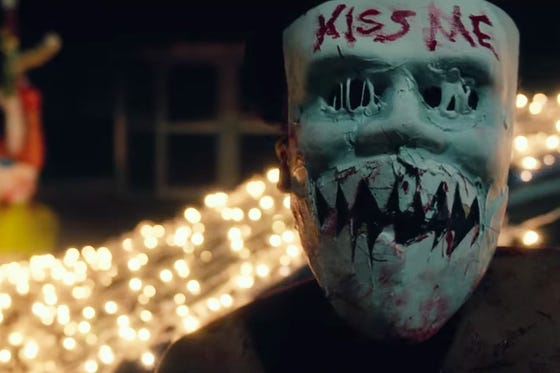The Purge: Election Year

Three summers ago, “The Purge” struck upon a brutally dystopian, and savagely entertaining, formula for the advance of malevolent mathematics in American politics and human nature. Its two sequels have borne the burden of showing the work – pulp-fiction proofs that remain interesting if far less flashy.
“The Purge: Election Year” fares slightly better than 2014’s “The Purge: Anarchy” because it’s populated with a far more compelling group of ragtag survivors roaming the streets in 2035 during the annual 12-hour Purge — during which all crime, up to and including murder, is legal. (If anything betrays producer Jason Blum’s otherwise shrewd micro-budget mentality, it’s the idea 2035 will look exactly like 2016.)
The New Founding Fathers – a pro-Purge political party that proposed it and has led America for 20 years – insist Purging keeps crime and unemployment rates low. The growing suspicion, proven in “Anarchy’s” third act, is that the Purge is a political smokescreen for predatory capitalism – under which minorities and the poor are culled, welfare and healthcare spending are slashed, insurance companies line their pockets with high-dollar premiums for Purge coverage, and the very voters who would perhaps raise a voice against Purging are murdered.
So, a lunatic fringe vision of Republicans. But not Donald Trump. Franchise creator / writer-director James DeMonaco knows there’s no sense satirizing those who have taken a swan dive off the edge of absurdity. (“Our country will be better for it!” is as close as this gets to “Make America great again!”)
Instead, DeMonaco aims at a conservative movement that cloaks its craven, cowardly behavior in a tight swaddle of Pentecostal fervor – a more easily weaponized, and depressingly effective, evangelical danger. On one hand, you lament losing his initial concept of the Purge as a failure that knew no aisle. On the other, why not spit in the current face of willful obstruction to progress and obfuscation of process?
Kyle Secor plays the Founding Fathers’ poster boy, a minister-cum-presidential-candidate with Mitt’s mug and Ted’s tongue. With Nazi Eagle-esque bling dangling from his neck, the minister’s response to Purging feels as much like an orgasm as a baptism. A caricature, yes, but one that pierces with purpose and power.
His opponent is Senator Charlotte “Charlie” Roan (Elizabeth Mitchell), an independent riding a wave of anti-Purge sentiment. If elected, she would abolish the Purge, which wiped out the rest of her family upon its commencement 18 years earlier. Naturally, this sticks in the craw of Founding Father leader Caleb Warrens (Raymond J. Barry, a perfect rancid proxy for Reince Priebus), who plots to eliminate her.
Ostensibly leveling the Purge’s playing field by lifting a restriction on harming government leaders, the Founding Fathers give themselves fiat to ambush Roan in her home and chalk it up to carnage. But after their plot fails, Roan takes to D.C.’s streets in flight from a group of mercs led by the hulking Earl (Terry Serpico, which is not, I humbly assure you, a pseudonym for a frighteningly buff Anthony Michael Hall).
Two familiar faces help Roan out: Leo Barnes (Frank Grillo), the ex-cop whom we saw grappling with vengeance in “Anarchy” and who is now the lead Secret Service agent in charge of Roan’s security; and Dwayne (Edwin Hodge), the wounded war veteran upon whose pleas for help the first film pivoted and now the face of an underground uprising against the Founding Fathers.
A trio of newcomers also enters the fray: Joe (Mykelti Williamson), an inner-city deli owner on whom Purge insurance rates surged, and his coverage dropped, a day before the event; Joe’s stock boy Marcos (Joseph Julian Soria), adept at self-defense after a lawless early life in Juarez, Mexico; and Laney (Betty Gabriel), a gangbanger turned paramedic whose violent past proves an asset as the night wears on.
Consider them the Romero Repertory Players, whose coalition of the killing embarks on a series of escalating standoffs and sacrifices. And if this sounds like “24” meets “The Purge,” that’s what you get – albeit a good episode of “24.” Grillo’s inherently interrogative persona makes him a sufficient stand-in for Kiefer Sutherland. Plus, “Election Year” merges siege-movie mentality with a side of sociological commentary more skillfully than in “Anarchy.”
Foreign murder tourists offer an unintentionally timely nod to the xenophobic isolationism that powered the Brexit vote. Meanwhile, a woman who has murdered her husband laments, “Purging didn’t make me feel better like they said it would” – echoing the repercussions of post-Brexit voter regret.
Through Joe (think Freddy from “House of Cards” were he handy in a scrape), DeMonaco also sharpens the blade on “Election Year’s” look at ethnic identity. “It’s Purge night. You don’t just sneak up on black people,” he admonishes Marcos in the film’s best line. But Joe also utters nearly all of the film’s most stereotypical “lesser-than” comments – an interesting assertion of classism across color lines. You also sense animus in the racially charged bristling between Joe and Leo (who call each other “Deli Man” and “Secret Service Guy”), which recalls Bruce Willis and Samuel L. Jackson in “Die Hard with a Vengeance.”
Where “Election Year” stumbles most is ramping up the other films’ most ridiculous element – theatrically grotesque murder tableaus upon which heroes stumble. Guillotines, gauntlets, swordfights and bedazzled rifles feel far more like goofy performance art than realistic crime run rampant – much of it perpetrated by people in more elaborate costumes than Comic-Con cosplayers (furries included).
But still, more than any YA adaptation from the last 10 years, here’s a movie that continues to tap into very believable oppression, easily recognizable outrage and the outer limits of how greatly you might lay your body down for a platform and the person to whom it belongs. The finale reaches a natural endpoint, but for a franchise on its third go-round, it offers a far tougher face-off against real-world ideas than you might expect.


